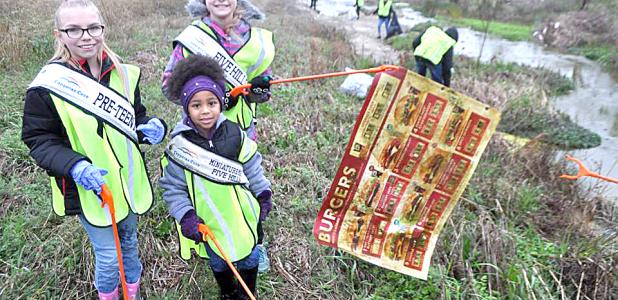Five Hills royalty confront Cove’s cigarette butt battle
Special to Leader-Press
The Texas Department of Transportation estimates that 130 million cigarette butts a year are tossed out on state highways alone, not counting county roads, city streets and other areas of travel.
Young Miss Five Hills Allyssa Kimball headed up a team of volunteers to clean up the trashy mess in Copperas Cove on Saturday.
Kimball and the Five Hills royalty traveled in a caravan to nearly 30 of the Hill Country Transit District HOP bus stops, a regional public transit system that serves a nine-county rural area including Copperas Cove.
Equipped with gloves, dustpans and brooms and metal grabbers, Kimball and her sister royalty proved that the queens were not afraid to get their hands dirty.
“Going around Copperas Cove to the HOP bus stops was an eye-opening experience. The amount of cigarette butts that we cleaned up at just 27 stops was astonishing,” Kimball said. “It’s important for people to realize that even just one cigarette butt adds up and that we need to take a lot more care of our city and these stops that it provides for us.”
Copperas Cove City Fire Chief Gary Young shared the project with Kimball and suggested that the bus stops were areas where discarded cigarette butts were a serious concern.
“Cigarette butts are litter. People who would never toss an aluminum can people who would never toss an aluminum can on the street, do toss cigarette butts believing they are small and biodegradable and therefore not litter,” Young said.
Cigarette filters are not biodegradable. A popular misconception is that filters are made of cotton, but they are actually made of cellulose acetate, a form of plastic that can take years to degrade, Young said.
The purpose of a cigarette filter is to reduce the toxins inhaled by the smoker which means that those chemicals are concentrated in the remnants of the cigarette. One of Young’s biggest concerns with the discarded butts is that they cause fires.
“Cigarettes can cause brush fires as well as indoor fires. Smoking-related fires contribute to 800 deaths per year in the U.S.,” Young said.
Kimball and the titleholders also learned that the discarded butts angered residents living near the bus stops when a home owner came out of her house complaining about the discarded butts. The citizen thanked the royalty for their assistance in keeping not only the city clean.
“Some of these (bus) stops are even in people’s yards and this litter on their property greatly upsets them,” said Kimball. “Unfortunately, most of these stops did not have trash cans for people to throw their cigarettes in.”
“Clean up is costly,” Young said. “Like all litter, someone has to clean it up or it becomes unsightly.”
Filters are toxic and both children and fish can mistake them for food. This prompted the Five Hills royalty to also clean up more cigarette butts and other trash and debris in conjunction with the Great Texas Waterways Clean-Up in Killeen. Since butts are light, they are often carried by rainwater to Texas waterways, adding pollutants to Texas creeks.

